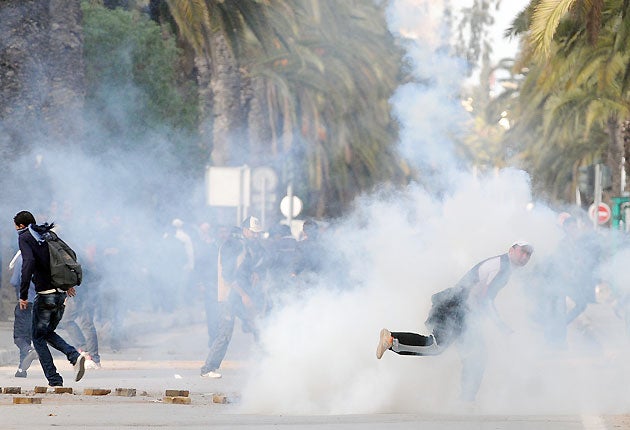Tunisia president quits after protests

Your support helps us to tell the story
From reproductive rights to climate change to Big Tech, The Independent is on the ground when the story is developing. Whether it's investigating the financials of Elon Musk's pro-Trump PAC or producing our latest documentary, 'The A Word', which shines a light on the American women fighting for reproductive rights, we know how important it is to parse out the facts from the messaging.
At such a critical moment in US history, we need reporters on the ground. Your donation allows us to keep sending journalists to speak to both sides of the story.
The Independent is trusted by Americans across the entire political spectrum. And unlike many other quality news outlets, we choose not to lock Americans out of our reporting and analysis with paywalls. We believe quality journalism should be available to everyone, paid for by those who can afford it.
Your support makes all the difference.Tunisian President Zine al-Abedine Ben Ali stepped aside today after failing to quell the worst anti-government unrest in his two decades in power.
As the prime minister stepped in until promised elections can be held, Ben Ali's whereabouts were unclear. Al Jazeera television said he had left the country.
The violence and rapid turn of events sent shockwaves across the Arab world, where similar authoritarian rulers are deeply entrenched, but face mounting pressures from swelling young populations, economic hardship and the appeal of militant Islam.
In a television address in Tunis, Prime Minister Mohamed Ghannouchi said he was taking over as president and would remain as caretaker leader until early elections.
"Since the president is temporarily unable to exercise his duties, it has been decided that the prime minister will exercise temporarily the duties," he said.
"I call on the sons and daughters of Tunisia, of all political and intellectual persuasions, to unite to allow our beloved country to overcome this difficult period and to return to stability."
The latest unrest was sparked when police prevented an unemployed graduate from selling fruit without a licence and he set fire to himself, dying shortly afterwards of his burns.
In power since 1987, Ben Ali had earlier on Friday declared a state of emergency and said protesters would be shot in an increasingly violent confrontation. Ben Ali had earlier dismissed the government and called an early parliamentary election.
As the violence escalated, police fired tear gas to disperse crowds in central Tunis demanding his immediate resignation. They were not satisfied with his promise on Thursday to step down, but only at the end of his current term in 2014.
Opposition leader Najib Chebbi, one of Ben Ali's most outspoken critics, described the events as a "regime change".
"This is a crucial moment. There is a change of regime under way. Now it's the succession," he told France's I-Tele TV.
"It must lead to profound reforms, to reform the law and let the people choose."
The White House said Tunisians should have the right to choose their own leader. It was monitoring developments in Tunisia and called on authorities there to respect human rights.
"We condemn the ongoing violence against civilians in Tunisia, and call on the Tunisian authorities to fulfil the important commitments ... including respect for basic human rights and a process of much-needed political reform," White House spokesman Mike Hammer said in a statement.
Western countries urged their people to avoid travel to the popular tourist destination due to the instability.
Medical sources and a witness said 12 people died in overnight clashes in Tunis and the northeastern town of Ras Jebel.
Before the latest casualties, the official death toll in almost a month of violence was 23. The Paris-based International Federation for Human Rights said it had a list of at least 66 people killed.
U.N. Secretary Ggeneral Ban Ki-moon urged restraint.
"The political situation is developing fast and every effort must be made by all concerned parties to establish dialogue and resolve problems peacefully to prevent further loss, violence and escalations," he said.
"And I will continue to discuss this matter with the concerned parties."
After police fired tear gas and wielded their truncheons, crowds of youths retreated a little way from the building and started throwing stones at the police, who responded with more tear gas grenades. Reporters also heard gunfire nearby.
A Reuters photographer saw people looting two big supermarkets in the Tunis suburb of Enkhilet, about 10 km (6 miles) from the capital. He said they had set fire to the local police station.
On almost every block in suburban Tunis, people were standing on the street with baseball bats to protect their cars and homes from damage by looters, a Reuters reporter said.
Join our commenting forum
Join thought-provoking conversations, follow other Independent readers and see their replies
Comments